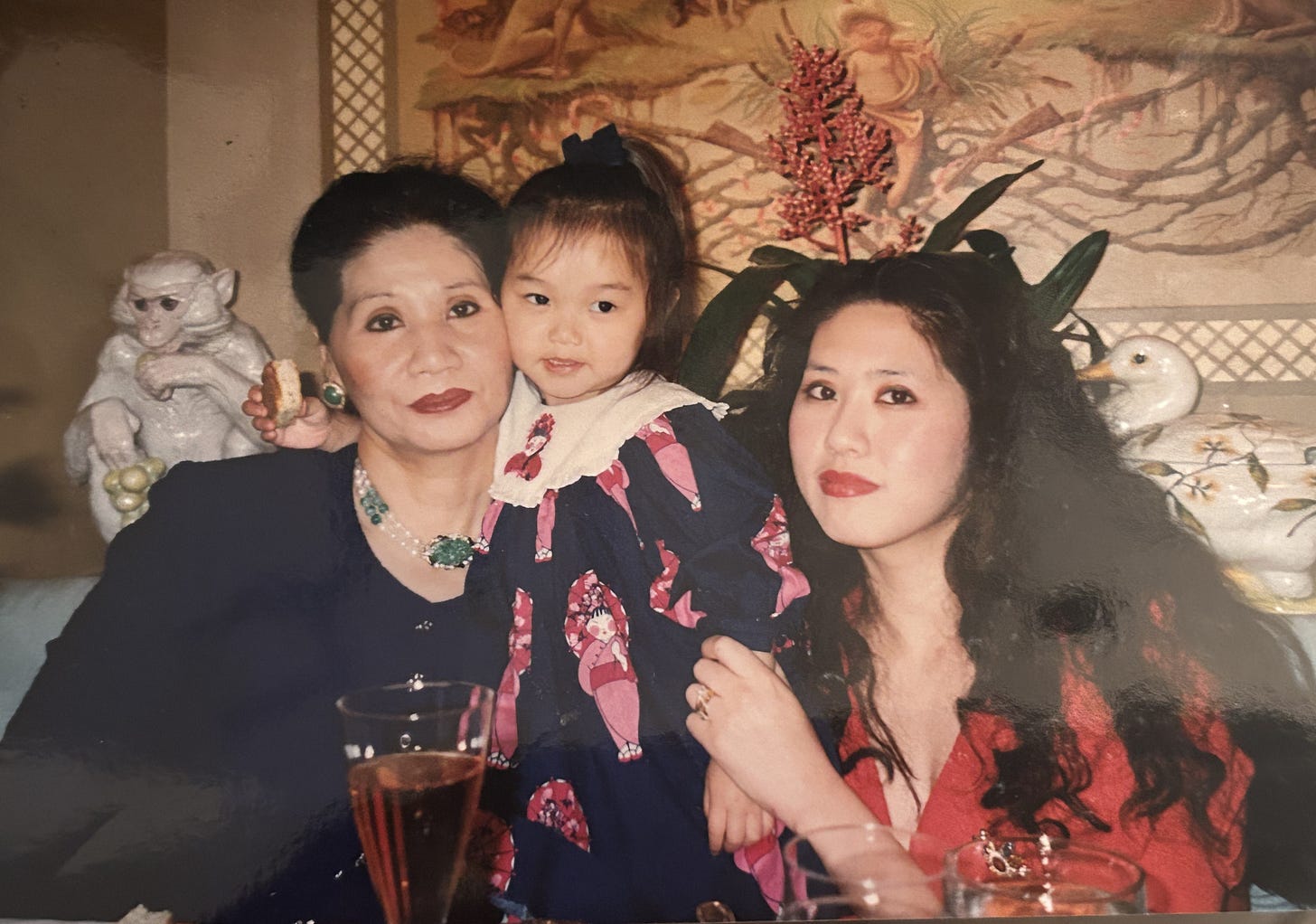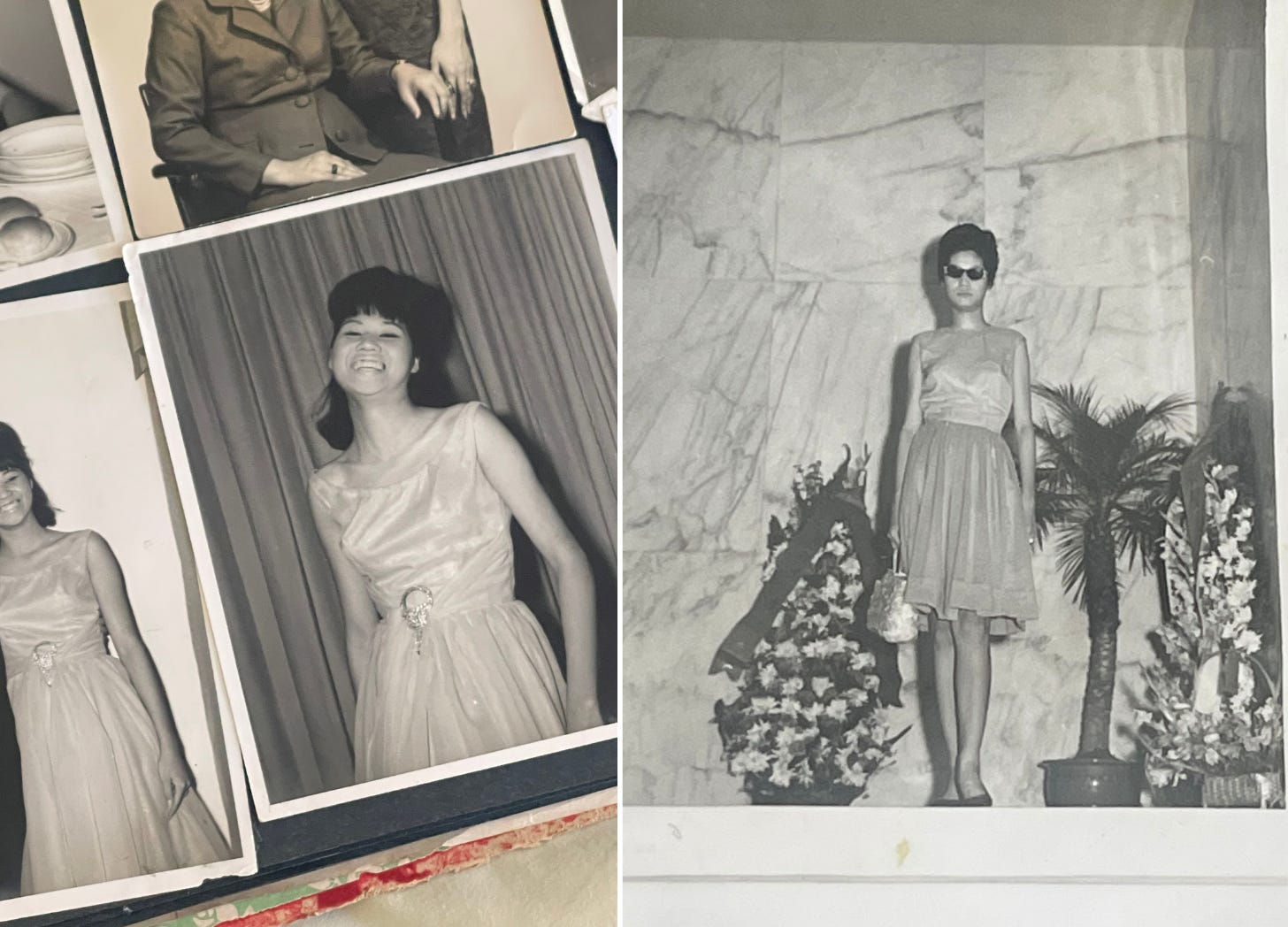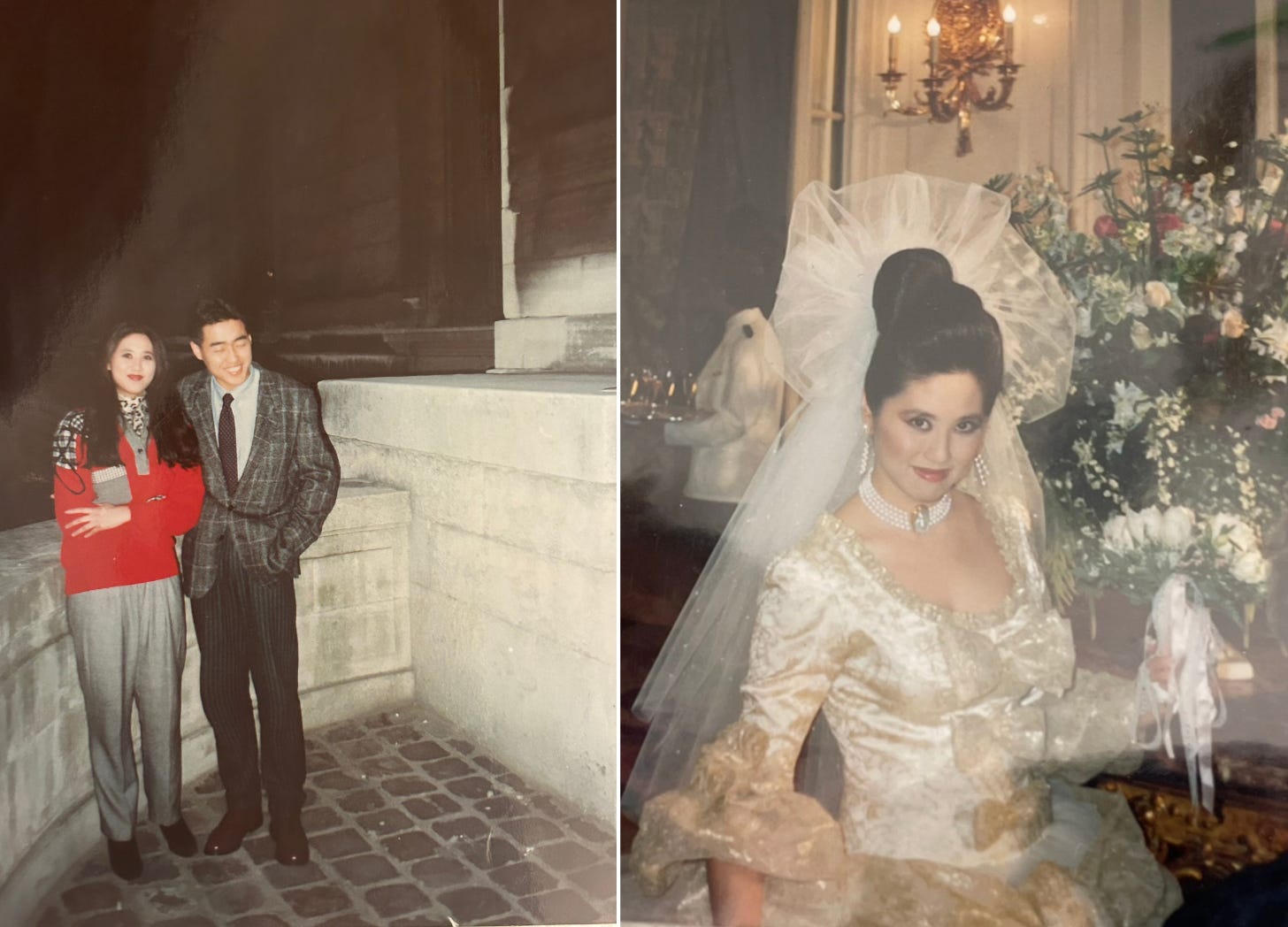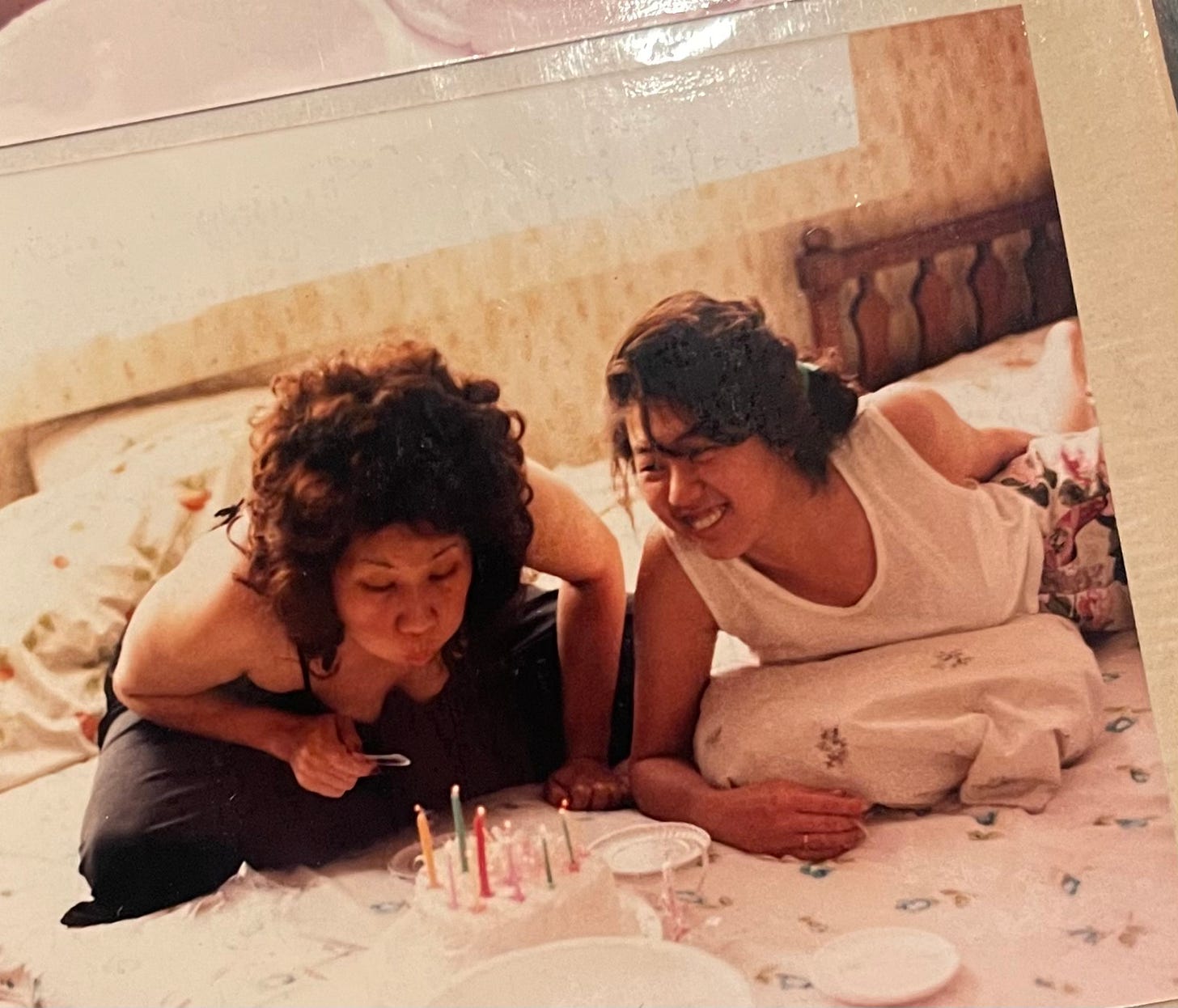Relationship advice from the '60s and '80s: outdated or pertinent?
I interviewed my mom and grandma. They told it as it was.
Hey there. When I’m home in Southern California, as I am now, I live with my mom and my grandma. Three generations of women under one roof is a blessing but a doozy. If winding conversation were a sport, we would sweep the podium—and my memoir, were I ever to write one, would be titled Women in Bathrobes Talking Shit.
This week, we sat down to chat dating and relationships. I asked what they wore on first dates in the ’60s and ’80s, if ghosting existed, and when it was appropriate to DTR, if at all. I asked what advice they’d give their younger selves and what they’d offer others.
My grandma, born in 1946 in Taipei, was married by 20, a mother of two by 23, and widowed at 36. My mom, born in 1968, was married by 22, had me at 24, and divorced by 32. If their words feel outdated, unsavory even, in 2025, that’s the point. Times change, but people don’t. Every generation believes they did it best, and there is no right way to architect a life—try as we might.
Below is our conversation edited for clarity.
How did people in your generation usually meet their partners?
G-MA: My father was rich, so a matchmaker.
MOM: Through school, work, clubs, just going out. There wasn’t any technology at that time. Back then, I think men were more forthcoming.
Well, you don’t really know what men are like now though.
MOM: It’s the sense that I get.
Who paid for the first date?
G-MA: Men. No such thing as a dutch account. (She means going dutch.) We go out, we go see a movie—men pay, men pay.
Did you ever pay for anything?
G-MA: No.
Not one thing?
G-MA: No.
MOM: Men paid for the first date. Going dutch is not conducive to romance.
What did you wear on a first date?
G-MA: A dress. Sometimes a skirt with a top. Hair, I don’t do myself. I go to a beauty salon. For shoes, one-inch high heels or sandals with a lot of bling-bling. Lipstick, maybe some eyeliner. Never foundation. I don’t put eyebrows because I don’t know how to draw eyebrows. I was very stylish for that time. Sometimes we’d (she and her sisters) go to a fabric store and have dresses special-made for us. At that time, there was no Chanel, Louis Vuitton, Hermès. Fashion was you go to a store and have clothes made for you.
MOM: It was a production. Full on hair, full face of makeup, feminine, sexy, heels, stockings, skirts, dresses...
No stylish pair of pants even?
MOM: No, we didn’t care about comfort.
What was considered a “proper date”?
G-MA: I never really went on dates because I’m tall and I intimidate men. (5,10” in her prime!) Actually, I dated one young man. His family was very rich. We went to a nightclub, people would sing. He had a car. He knew my family and I knew his family. He’s not a man you fall in love with. Okay only. I always saw him on Saturdays, maybe twice a month—just to have fun. I didn’t like other men. Nothing impressed me at all.
So, a nightclub?
G-MA: Movie, always a movie. A nightclub, maybe eat a little bit of dinner. Not fancy because at the time Taiwan was not a rich country. Sometimes dancing.
MOM: A movie or dinner or a party. The boy would pick you up, you didn’t drive to meet him there. Sometimes he’d bring flowers. It was formal. You could see the effort he put in. There was no confusion that this is a date.
Did ghosting exist?
G-MA: This is not happen to me.
MOM: Sure. There’s a label for it now but back then—hell yeah, it happened.
When would you define the relationship, if at all?
G-MA: The matchmaker only set me up twice. Once with a doctor. The other was a judge. His face wasn’t bad but he wiggled his ears. (She appeared disgusted. One might call this “the ick.”) My husband said he wanted to marry me before we even met because he knew my family. We met through my brother-in-law in Taiwan, then he moved to America for school. We wrote each other love letters. Then I moved to America and we got married.
MOM: The boy would ask to go steady. It could be as quick as a week or as long as a couple of months. Going steady meant monogamous. If a woman was sexually open without going steady, she was called “easy.”
Was it acceptable to date multiple people at once?
G-MA: No. You can’t put two feet on two boats.
MOM: I think it was fair game before going steady.
When would you sleep together for the first time?
G-MA: Once you’re married. Or at least engaged.
MOM: Whenever the two people felt like it.
How did people break up?
G-MA: This is not happen to me.
MOM: Face to face.
Were there any “rules” around dating?
G-MA: Very easy—girl don’t drink. The man could drink, but the girl shouldn’t drink. Our time was not that open. No one asked, ‘Do you want a drink?’
MOM: Never heard of any. It wasn’t until your generation that there were all these rules.
Was it expected that you’d marry?
G-MA: Oh for sure. My mother married at 18. When I look at you I think, ‘OH GOD.’ The goal was to have a baby as soon as possible.
MOM: Yes, in your twenties. The whole ‘focus on career and then marry’ wasn’t the M.O. back then.
At what age did it feel “late” to get married?
G-MA: After 23, people might say, ‘20-something still no husband.’
MOM: Anything past 30 was a little ‘hmmm.’
At what age did it feel “late” to have children?
G-MA: 28…29... If my mother was still alive, she would say 20.
MOM: I can’t really say, but no one was waiting.
If you could give your younger self advice about love, what would you say?
G-MA: Don’t yell. Be nicer. I was always yelling and nagging. I was not a very nice person. My husband was kind of slow and I’m kind of fast and impatient. When we would get ready to go out, I would say, ‘What are you doing, powdering your nose?’
(Turns towards my mom)
Your father was kind of slow, wasn’t he?
MOM: They… were on different speeds.
MOM: Be very sure of who you are and what you want, irrespective of what society, family, or your sphere of influence thinks.
You both experienced big relationship shifts early in life—widowhood at 36 and divorce at 32. How did that shape your love life afterward?
G-MA: After my husband died, I told myself if I ever got married again I would change. I felt regret. Had I known we’d only have 16 years together, I would have changed myself.
But you chose to never date again. Why?
G-MA: I was financially independent and didn’t want to have to figure out if a strange man liked me or my money. I wanted to protect my money. I don’t believe in, after losing your husband, bringing a stranger into the home. Definitely not my cup of tea. I also had a teenage daughter. If a man said, ‘Oh, sexy body’—then what am I going to do?? I don’t regret it at all. Besides, there was no one to date.
MOM: I realized it’s not just about love. Love is a feeling that comes and goes. I cannot stress enough that you have to viscerally like your partner as a human being. You can love someone without liking them.
What’s the hardest lesson you’ve learned in love?
G-MA: My husband was kind of fooling around with other women, but I was fine.
How come you were fine with it?
G-MA: Because my father was a womanizer. So were my brothers. I just figure ‘boys will be boys.’ What’s news to me?
MOM: The hardest lesson was having expectations that weren’t met. Unmet expectations cause heartache and big disappointment.
Most important quality in a partner?
G-MA: Make good money. Give me a good life. But if you say a man has money but is mean to you, I don’t like that too.
MOM: Kindness.
What’s your one piece of advice for others?
G-MA: Make sure the man you marry can financially provide for you. I’m not saying he has to be rich, but make sure he’s a provider. Besides health, finances are the second most important thing.
MOM: Manage your expectations.
Do you think love is mostly about luck, timing, or effort?
G-MA: I was lucky. My husband said, ‘I take you’ and I said, ‘okay, I take you too.’
MOM: Timing.
What’s something the younger generations are doing better than yours did?
(Twenty seconds of silence)
G-MA: I don’t like this generation’s kind of dating. I prefer my own timing.
MOM: I like the fact that people take more time to date before committing. Because getting married to the first guy that comes along can fuck up your entire life. Yes, you can say, ‘I got married and had kids young’ but then you’re miserable.
Looking back, what do you think your generation got right about love?
G-MA: Men valued family, especially their children. Not like nowadays… divorce… ‘oh, okay, you can have the kids.’ Even though my husband fooled around, he didn’t believe in divorce. He would never divorce me because he knew his children wouldn’t go with him. There were more defined roles, so everyone had the same expectations. If a woman worked, that’s fine, but it wasn’t expected.
MOM: The values of a traditional family. Boy meets girl. An intent to build a family. A single focus. Simpler. Now it feels complicated.
Do you believe men and women should have equal rights?
G-MA: During my time, I didn’t think about this. But now, yes. Well—I don’t know. I think men should have more financial responsibility.
MOM: Yes, of course.
That’s the end of my questions. Anything you want to add?
G-MA: Anything I want to add… when am I going to become a great grandma?
MOM: I believe there is value in the traditional family setup—a two-parent household.
Dude you’re like a full on conservative, it’s hilarious.
MOM: Yah, because I think it works well.
But that’s what you did and it didn’t work out for you.
MOM: Go back and read what I’d say to my younger self.
Have a story or topic I should look into? Write to me at: fendiliudufner@gmail.com. You can also reply to this email if you’re reading from inbox. 💌
In this Note: Americans aren’t having sex, pet loss grief is real, personal ads are back, and the best day/time combo for a first date.
Making friends is hard, but it’s easier on vacation. Researchers found that traveling—specifically having new, diverse experiences—boosts our mood and makes us more receptive to connecting to others.
Warner Bros. released the “Wuthering Heights” trailer and discourse has begun. The adaptation of Emily Brontë’s (“Ellis Bell”) 19th-century novel appears to star Jacob Elordi, Margot Robbie, and a soundtrack by Charli XCX. Some are excited. Others are calling it a cash cow, accusing producers of white-washing the characters and stripping the plot. Some speculate that because the title is in quotation marks, the film could be something else entirely.
Americans are having a record low amount of sex. Some reasons are familiar: the exhaustion of parenting, relationship issues, age. Others are newer: we’re addicted to our phones, declining cohabitation and marriage rates, dating app burnout, a demoralizing news cycle.
Pet loss grief is becoming more widely acknowledged—as it should. Over half of dog owners felt the grief of losing an animal was “similar or worse” to the loss of a family member. The most important part of this story, though, is that one woman illustrated a book called Kitty and the Moon, which features “a cat who discovers solace in the moon, learning that the celestial body unfurls into the shape of a sleeping cat.” If I stay on that for more than ten seconds, I will cry.
Personal ads, circa the ‘80s, are back! Submit your ad to The Cut’s new newsletter, Personals. “Do: shoot straight and be sincere,” it encourages. “Don’t: lie about your height or job—but light embellishments are fine.” The pendulum always swings back, baby. It always swings back.
Sunday at 3 p.m. is the best day/time combination for a first date: “You’re the most you you’ve ever been of the week.”
There may be an appetite for getting dommed by dating apps. Breeze bypasses in-app messaging altogether and sets up a date with your new match at a bar or restaurant of the app’s choosing. Its co-founder, Marco van der Woude, 30, thinks what daters really want in 2025 is to surrender the reins.
The future of dating could be your AI talking to others’ AIs, according to Whitney Wolfe Herd, founder of Bumble. Thanks, I hate it.
People with psychiatric conditions are more likely to marry someone with one too. The next time your spouse calls you “crazy,” quip back with: “Takes one to marry one!”
Is there any place for “choice” in the politics of queerness? It’s an interesting question posed by economist Corinne Low in her newsletter reflecting on her viral feature in The Cut. If you recall, Low became an “evidence-based lesbian.” One of the reasons she was able to do that successfully is because she rates herself a 2.5 on the Kinsey scale, in which zero is exclusively heterosexual and six is exclusively homosexual. Committing to a lifetime of queerness seems viable only if you are queer-curious to begin. But, is that okay? Is “sexual appropriation” a thing? Does any of it matter? I don’t know why one would care how an individual chooses to live their own life, but then again…
Married mothers are doing better than the media lets on. According to new research, married mothers are happier than unmarried women and married women without children “The reasons speak to the profound experience of parenthood. Married mothers were the most likely to agree that their life ‘has a clear sense of purpose.’” Fathers, too, according to one survey.
Imagine having to upload a photo of your ID to look at porn. New age verification laws in the U.S. and U.K. aim to protect teens, but critics worry about user privacy and the likely outcome that determined horny people will popularize shady sites that fuel issues like revenge porn and deepfakes instead.
Men don’t “age gracefully.” They “ferment.” Commenters are equally impressed with Oscar Isaac and with the new verb drop.
On a personal note: I colored my hair because when the urge beckons, I answer.










Haha I can hear them reading this ♡